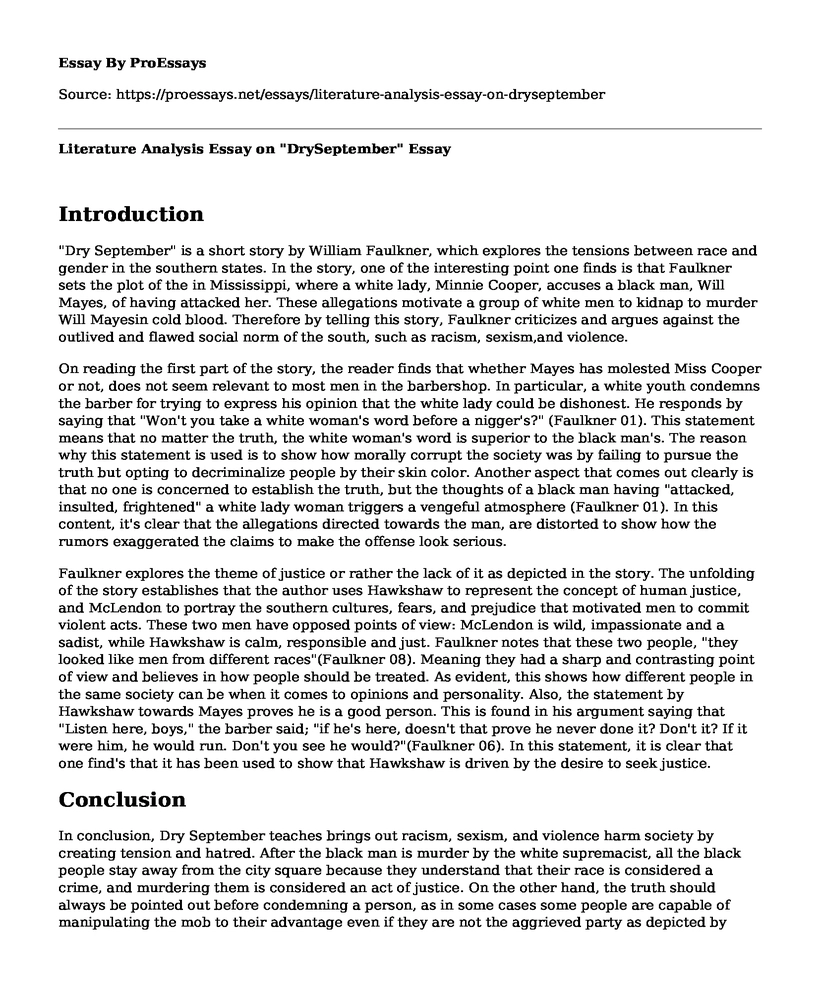Introduction
"Dry September" is a short story by William Faulkner, which explores the tensions between race and gender in the southern states. In the story, one of the interesting point one finds is that Faulkner sets the plot of the in Mississippi, where a white lady, Minnie Cooper, accuses a black man, Will Mayes, of having attacked her. These allegations motivate a group of white men to kidnap to murder Will Mayesin cold blood. Therefore by telling this story, Faulkner criticizes and argues against the outlived and flawed social norm of the south, such as racism, sexism,and violence.
On reading the first part of the story, the reader finds that whether Mayes has molested Miss Cooper or not, does not seem relevant to most men in the barbershop. In particular, a white youth condemns the barber for trying to express his opinion that the white lady could be dishonest. He responds by saying that "Won't you take a white woman's word before a nigger's?" (Faulkner 01). This statement means that no matter the truth, the white woman's word is superior to the black man's. The reason why this statement is used is to show how morally corrupt the society was by failing to pursue the truth but opting to decriminalize people by their skin color. Another aspect that comes out clearly is that no one is concerned to establish the truth, but the thoughts of a black man having "attacked, insulted, frightened" a white lady woman triggers a vengeful atmosphere (Faulkner 01). In this content, it's clear that the allegations directed towards the man, are distorted to show how the rumors exaggerated the claims to make the offense look serious.
Faulkner explores the theme of justice or rather the lack of it as depicted in the story. The unfolding of the story establishes that the author uses Hawkshaw to represent the concept of human justice, and McLendon to portray the southern cultures, fears, and prejudice that motivated men to commit violent acts. These two men have opposed points of view: McLendon is wild, impassionate and a sadist, while Hawkshaw is calm, responsible and just. Faulkner notes that these two people, "they looked like men from different races"(Faulkner 08). Meaning they had a sharp and contrasting point of view and believes in how people should be treated. As evident, this shows how different people in the same society can be when it comes to opinions and personality. Also, the statement by Hawkshaw towards Mayes proves he is a good person. This is found in his argument saying that "Listen here, boys," the barber said; "if he's here, doesn't that prove he never done it? Don't it? If it were him, he would run. Don't you see he would?"(Faulkner 06). In this statement, it is clear that one find's that it has been used to show that Hawkshaw is driven by the desire to seek justice.
Conclusion
In conclusion, Dry September teaches brings out racism, sexism, and violence harm society by creating tension and hatred. After the black man is murder by the white supremacist, all the black people stay away from the city square because they understand that their race is considered a crime, and murdering them is considered an act of justice. On the other hand, the truth should always be pointed out before condemning a person, as in some cases some people are capable of manipulating the mob to their advantage even if they are not the aggrieved party as depicted by Miss Cooper's exploitation of sexism.
Works Cited
Faulkner, William. Dry September. 1931.
Cite this page
Literature Analysis Essay on "DrySeptember". (2022, Dec 08). Retrieved from https://proessays.net/essays/literature-analysis-essay-on-dryseptember
If you are the original author of this essay and no longer wish to have it published on the ProEssays website, please click below to request its removal:
- The Concept of Doublethink
- Ars Poetica by Archibald MacLeish - Critical Thinking Example
- Courage and Cowardice in the Novel The Things They Carried and the Film Restrepo
- Essay Sample on Dramatic Irony
- Mary Shelly's Frankenstein and Its Relation to Romanticism Essay
- Interpreting Poetic Messages From the Bible Paper Example
- Essay Sample on Living in an Abusive Marriage: The 'Sweat' Story by Zora Neal Hurston







